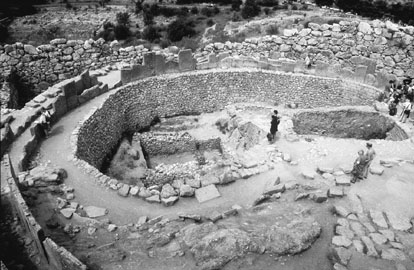

 | Page 598 |  |
archaeology to be set up in Athens was that of the French, established in 1846 partly as an artists’ colony. During the 1870s and 1880s this school was joined by German, American, British, and Italian schools of archaeology. Today there are seventeen such schools in Greece.

Aerial view of the ruins of Mycenae
(Image Select)
The government had much to gain in terms of international prestige by encouraging these schools; the Americans and British, for example, were both given state land for their institutions. On occasion, negotiations between governments was directed more by political considerations than by archaeological ones. In 1892, for instance, the French were given a permit for major excavations at the prestigious site of Delphi on condition that they pay for the removal of the village that had grown up on the site; more to the point, perhaps, the French had won the permit over their U.S. rivals by removing their import duty on Greek currants. In 1911, while the Greek Archaeological Service was excavating the Temple of Artemis on Corfu, the Kaiser of Germany visited the site. He was so impressed that he asked if Germany could take over the site, and the Greek government gave him the rights to excavate. Just two days later Greece formally asked Germany and the other western powers to put political pressure on Turkey concerning its treatment of Greeks living within its borders. The excavation, in other words, was merely a bargaining tool in international politics, and the feelings of the Greek archaeologists who had already invested so much time and money in the site were ignored.
The position of the Greek government was often a difficult one. It certainly gained prestige and a measure of political power by granting or withholding excavation permits to foreigners, but it was also important that it should be Greek archaeologists who excavated the great sites. Unfortunately, the foreigners often had more money. During his first season at Knossos, Arthur Evans was able to employ up to 300 men and women, with bonuses for good work or the discovery of an important find. The funds came almost entirely out of his own (and his father’s) pocket, and they had a considerable impact on local employment and prosperity.
Often it was hard for the various Greek societies and institutions to match foreign funding. A
 |  |